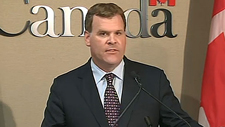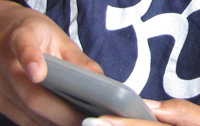News from Canada, France and India
Tuesday's World Events — Posted on September 11, 2012
CANADA – Government closes Tehran embassy, kicks out diplomats

Canada’s Foreign Affairs Minister John Baird
TORONTO | Canada shut its embassy in Tehran on Friday, severed diplomatic relations and ordered Iranian diplomats to leave [Canada], accusing the Islamic Republic of being the most significant threat to world peace.
The surprise action…comes as Iran’s talks with world powers over its nuclear program have stalled and Israel is weighing the option of a military strike to prevent it from developing atomic weapons. Iran insists its nuclear program is for peaceful objectives only. …
[Canada’s] Foreign Affairs Minister John Baird said that the Canadian embassy in Tehran will close immediately and Iranian diplomats in Canada have been given five days to leave.
A spokesman for Iran’s foreign ministry, Ramin Mehmanparast, called Canada’s decision “hasty and extreme” and said that Iran would soon respond, the semiofficial Fars news agency reported.
A note in Persian posted on the door of Iran’s embassy in Ottawa read: “Because of the hostile decision by the government of Canada, the embassy of the Islamic Republic of Iran in Ottawa is closed and has no choice but to stop providing any consular services for its dear citizens.”
Baird said Canada was officially designating Iran a state sponsor of terrorism and gave a long list of reasons for Canada’s decision, including Tehran’s support for Syria’s embattled President Bashar Assad in that country’s civil war.
“The Iranian regime is providing increasing military assistance to the Assad regime; it refuses to comply with U.N. resolutions pertaining to its nuclear program; it routinely threatens the existence of Israel and engages in racist anti-Semitic rhetoric and incitement to genocide,” Baird said in a statement. “It is among the world’s worst violators of human rights; and it shelters and materially supports terrorist groups.”
Baird said he was also worried about the safety of diplomats in Tehran following attacks on the British embassy there.
FRANCE – Wealthiest man applies for Belgian citizenship as taxes are raised

Bernard Arnault
PARIS | France’s richest man has applied for Belgian nationality amid plans by socialist president Francois Hollande for a new 75 per cent tax rate on citizens making over $1.2 million per year.
Bernard Arnault, the CEO of LVMH, a French brand group that includes Christian Dior and Louis Vuitton, confirmed on Sunday that he had applied for dual citizenship in Belgium, where taxes for the rich are not as high.
Mr. Hollande, who once said he does not “like the rich,” has proposed a new higher tax rate of 75 per cent on earnings over €1million [$1.28 million], which is due to come into force later this year.
The president did, however, state that the tax plan could be scrapped after around two years. “Once the economy has recovered it can be dropped,” he said. Mr. Hollande also outlined another $19 to 25 billion worth of new tax rises [Saturday] night, mainly on businesses and the wealthy, as well as austerity measures that would save the country another $12.7 billion.
Mr. Arnault, who is the world’s fourth richest person with a personal wealth estimated at $40.8 billion, emigrated to the U.S. during the last socialist presidency in France in 1981, when François Mitterrand took power. He returned after the socialists switched to a more conservative economic course.
However, he denied on Sunday night that his latest move was an attempt to dodge Mr. Hollande’s measures. “I am and will remain a tax resident in France and in this regard I will, like all French people, fulfil my fiscal obligations,” he said.
“Our country must count on everyone to do their bit to face a deep economic crisis amid strict budgetary constraints,” he continued, adding that his bid for dual nationality was “linked to personal reasons” and began some months ago.
Mr. Arnault’s move was reportedly linked to a “sensitive” investment project that could be eased if he acquired Belgian nationality. …
INDIA – Vodafone Bows to India’s Text Curbs

Vodafone Group has complied with Indian government orders forcing the country’s cell phone operators to restrict text-messaging services, part of India’s effort to curb mass panic that riled parts of the country in recent weeks. [NOTE: Vodafone Group is a British multinational telecommunications company headquartered in London. It is the world’s second-largest mobile telecommunications company measured by both subscribers and 2011 revenues (in each case behind China Mobile), and had 439 million subscribers as of December 2011.]
The Indian government imposed the restrictions starting [August 20th,] after viral SMS messages contributed to a public panic in the wake of violent clashes between Muslims and predominantly-Hindu Bodo residents in the northeast state of Assam.
The messages, which emerged alongside online videos and social-networking posts, warned of a Muslim retaliation and caused thousands to flee Indian cities in fear of violence.
The result has been a government-enforced clampdown on text messaging—a reminder to Vodafone of the hazards of doing business in high-growth emerging markets and a nuisance to many Indian cellphone users, particularly for those who rely on texting.
For Vodafone, the restrictions come about a year and a half after the mobile giant complied with Egyptian government demands to shut down mobile services in the midst of a popular uprising against the Mubarak regime.
Though the restrictions in India are of a different nature, they too mark a service shutdown at the behest of government demands. …
(The news briefs above are from wire reports and staff reports posted at Chicago Sun Times on Sept. 7, London’s Daily Telegraph on Sept. 9 and WSJ.com on Aug. 25.)
Background
CANADA:
Britain downgraded ties with Iran following an attack on its embassy in Tehran in November 2011, which it insists was sanctioned by the Islamic Republic’s ruling elite. After the attack, Britain pulled all of its diplomats out of Iran and expelled Iranian diplomats from U.K. soil.
Most European countries maintain a diplomatic presence in Tehran despite increased tensions over European Union sanctions that block imports of Iranian oil. The Swiss represent diplomatic interests of the United States, which broke ties with Tehran after protesters stormed the U.S. Embassy in the chaotic months following the Islamic Revolution in 1979. Fifty-two Americans were held for 444 days.
Canada’s break with Iran removes another channel for Washington to get first-hand diplomatic assessments of Iranian affairs. Canada and Britain had been main conduits of information for the U.S., which also maintains special Iranian monitoring offices in several locations including Dubai.
But Canadian relations with Iran have been strained since former Canadian Ambassador Ken Taylor helped rescue six Americans during the hostage crisis three decades ago. The countries resumed normal diplomatic relations with an exchange of ambassadors in 1996.
But relations soured again in 2003 after Zahra Kazemi, a freelance photographer with dual Canadian-Iranian citizenship, died in custody. Kazemi was arrested while taking photographs outside a Tehran prison in 2003.
Canada also has criticized Iran over the arrest of pioneering Canadian-Iranian blogger Hossein Derakshan, who helped develop the first Farsi language blogs and is considered one of the founders of Iran’s social media community. Derakshan was detained in 2008 and sentenced to nearly 20 years in prison two years later.
Canada hasn’t had a fully accredited ambassador in Tehran since Iran ordered Canada’s ambassador, John Mundy, to leave the country in 2007 after trying unsuccessfully to come to an agreement on an exchange of ambassadors for some time.
Foreign Affairs Minister Baird said the skeleton staff that was operating Canada’s embassy has already fled the country.
“The Iranian regime has shown blatant disregard for the Vienna Convention and its guarantee of protection for diplomatic personnel,” Baird told reporters in Vladivostok, Russia, on the sidelines of the 21-nation Asia-Pacific Economic Co-operation forum. “Under the circumstances, Canada can no longer maintain a diplomatic presence in Iran. Our diplomats serve Canada as civilians and their safety is our No. 1 priority.” (from the Chicago Sun Times article)
INDIA:
In India on August 20, as some Vodafone users exchanged Eid holiday wishes, they were greeted with the following response: "Dear Customer! You have sent 5 SMS [text messages] today. As per instructions from the Government Regulatory, only 5 SMS can be sent per day." By late Thursday [Aug. 23], the government had loosened the restriction to 20 text messages from five.
The restrictions apply to pay-as-you-go phones, which comprise over 95% of the Indian market. The Indian government said the restrictions, which apply to an estimated 610 million prepaid cell phone users, would be in place for two weeks, until Sept. 1. The government also ordered certain Twitter accounts and Facebook pages blocked.
"Vodafone is complying with the instructions from the government of India and [the Department of Telecommunications]," the mobile operator said in a statement, without elaborating much further.
For some mobile users in India, the text-messaging restrictions are particularly problematic. Those include the hearing-impaired, who rely heavily on text messages to communicate with friends and family. "How does the government expect us to inform family members of our whereabouts," said Ashok Kumar, a 24-year-old hearing-impaired NGO worker, communicating with the help of an interpreter. Mr. Kumar, who on an average sends up to 80 text messages in day, slammed the government's move as "shortsighted."
The move to a 20-message limit pleased many users, who understand the need to tamp down on public panic. "Five was pushing it too far but 20 SMSes suit me just fine," said 19-year-old Sehar Mirza, a student at Delhi University. (from the Wall Street Journal article)
 Vodafone Group has complied with Indian government orders forcing the country’s cell phone operators to restrict text-messaging services, part of India’s effort to curb mass panic that riled parts of the country in recent weeks. [NOTE: Vodafone Group is a British multinational telecommunications company headquartered in London. It is the world’s second-largest mobile telecommunications company measured by both subscribers and 2011 revenues (in each case behind China Mobile), and had 439 million subscribers as of December 2011.]
Vodafone Group has complied with Indian government orders forcing the country’s cell phone operators to restrict text-messaging services, part of India’s effort to curb mass panic that riled parts of the country in recent weeks. [NOTE: Vodafone Group is a British multinational telecommunications company headquartered in London. It is the world’s second-largest mobile telecommunications company measured by both subscribers and 2011 revenues (in each case behind China Mobile), and had 439 million subscribers as of December 2011.]

